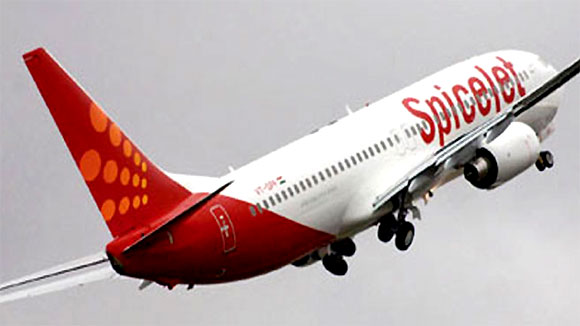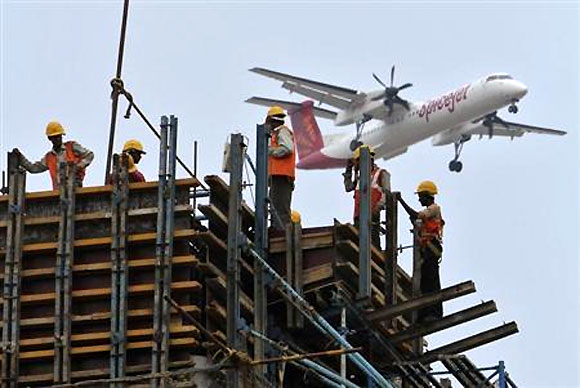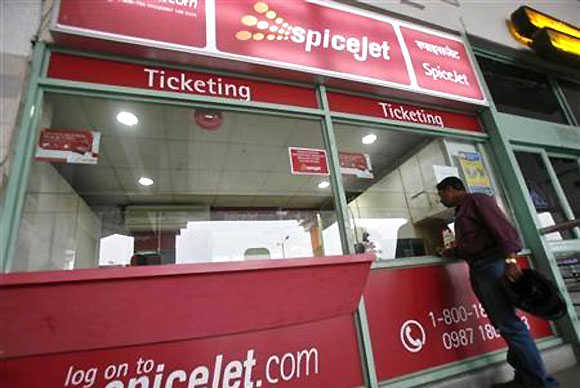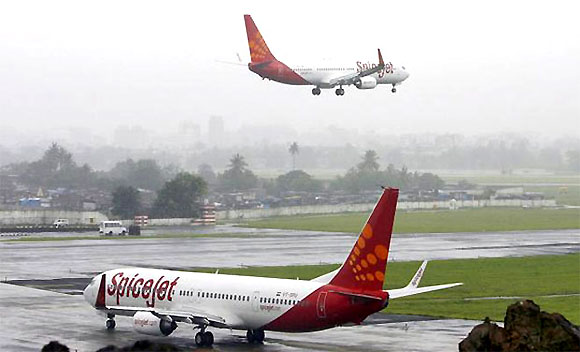
The SpiceJet stock has fallen 1.7 per cent against 2.3 per cent fall in the broader markets after the results on Monday, thanks to slightly better-than-expected results.
Its June quarter revenues were up 16 per cent over the year-ago period to Rs 1,700 crore (Rs 17 billion) largely on the back of a 13 per cent increase in passenger volume growth and better realisations.
Though net profit was down 10 per cent year-on-year to Rs 51 crore, it was above analyst estimates of about Rs 36 crore (Rs 360 million). Better margins and slower growth in finance costs (up 12 per cent year-on-year to Rs 28.6 crore) were key positives.
However, due to unfavourable industry prospects and given that the September quarter is traditionally a weak one, the outlook for SpiceJet is not favourable.
To increase loads in a low traffic season, airline companies have started to offer fares at discounted levels.
Further, what aggravates the situation is the fall in rupee and the rise in fuel prices. With nearly 67 per cent of SpiceJet's sales constituted by dollar-denominated costs such as fuel, lease rentals and maintenance, a weakening rupee causes costs to bloat.
In a lean season, companies are typically unable to fully recover the same with price rises.
Click on NEXT for more...

Though the increase in international routes and revenues from this segment for SpiceJet is a positive and should lead to higher yields, analysts are not too sanguine about the sector’s prospects (and hence SpiceJet) going ahead.
Say Rashesh Shah and Sneha Agarwal of ICICI Direct, “The operating environment is expected to remain challenging in the medium term due to weak currency, higher crude (oil) prices, rising competition and slowdown in passenger growth."
The company on its part says that it continues to explore new opportunities for business growth and improve fleet utilisation by adding to its international network and implementing multiple initiatives with a view to controlling the overall cost of doing business.
While a weaker rupee and higher fuel prices do hurt airline companies, irrational pricing has been the key reason for the aviation stocks languishing on bourses.
SpiceJet has lost 39 per cent since the start of May this year, leading to attractive valuations.
Click on NEXT for more..

Consequently, about half of the analysts tracking the sector having a buy on the company, but the other half is neutral/sell due to the sector headwinds.
Vikram Suryavanshi of Antique Stock Broking says that the stock is trading at attractive valuations 1.2 times Enterprise Value to Sales as compared to historical average of 2.8 times during the period FY06 to FY13.
He says that increasing market share and relative strong balance sheet should lead to a re-rating on the valuation front for the company.
On the other hand, Rajani Khetan and Mark Webb of HSBC are neutral with a price target of Rs 32.
They say, "The July-September quarter is the seasonally weakest quarter for travel. In addition to this, jet fuel prices have been rising recently and the depreciation of the INR has continued. Together, this suggests strong near-term headwinds".
For investors, though, given the uncertainty on key parameters and the market's risk-averse mood, they should await consistent revenue and profit growth before taking any exposure to SpiceJet.
Click on NEXT for more...

Meanwhile, SpiceJet's average revenue per passenger increased by seven per cent to Rs 4,320 in June quarter. While the operating performance was helped by lower fuel costs (down by 300 basis points to 43 per cent of sales) and higher yields (up five per cent), load factors were lower year-on-year coming in at 77 per cent as against 80 per cent.
Overall, earnings before interest, depreciation, taxes and rentals was up 15 per cent year-on-year to Rs 313 crore (Rs 3.13 billion).
Says Suryavanshi of Antique, “The pricing discipline and increased international operations from three destination to eight helped the company to improve profitability. International operations account for 11 per cent of revenues.
The 13 per cent growth in passenger traffic and capacity additions to the tune of 25 per cent year-on-year as well as lower industry growth helped it to outperform peers.”